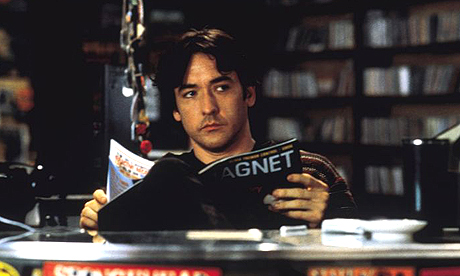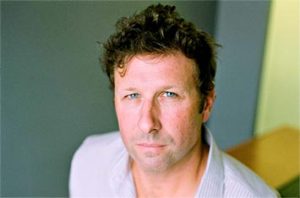
It is probably safe to say that in high school and college, I placed too much value in the guidance of High Fidelity. I saw the film for the first of many times in the winter of my sophomore year. As a teenager growing up in Vermont, there was something cool about a guy with an awesome apartment, a vinyl collection that could be organized auto-biographically! (That’s comforting. I know), and a hipper-than-thou record store in Chicago.
Without any serious romantic experiences at the time, it was easy to ignore the fact that Rob Gordon (nee Fleming in the book) was an awful boyfriend. Starting in high school through the present day of the film, he would stumble into relationships with women and then proceed to treat them poorly. The plot is set into motion when his girlfriend Laura has had enough of his man-child routine and moves out. Rob tries to figure out why this keeps happening and by the end of the movie starts to figure out just how to do right by the person he loves. [What? I ruined the ending of a book that is more than 15 years old and a movie that has been around for more than 10 years? Get over it. That is on you. You should still check the movie and book out. Good writing and acting is still good even if you know the ending.]

Nearly ten years since first watching the film, it is a part of the book that never made it into the movie that has continued to resonate with me. Since my copy is stored in my dad’s house in Brooklyn, I can’t cite specific page and setting, but the gist is pretty easy to get. As Rob makes his way through visiting his Top 5 Breakups, he thinks back to his childhood. He reminisces about the pre-adolescent version of himself. The one that has a fireman Halloween costume in the closet and cartoon bed sheets. Mid-30’s Rob realizes that if he were ever to encounter Child Rob, all he could do is apologize to the kid for being such a mess with his dismal record in the relationship department and his general disposition. Reading this book as a high school senior, it seemed to signal that at some point, adults come to and realize that in the blur of doing all their adult things, they go and drop the ball in areas of great import that get put on the back burner when they focus exclusively on their careers.
All of this has rushed back into my head in the last few weeks as I’ve taken up the stylings of an urban wanderer. It was during one of my T treks that a memory from seventh grade came to mind. For some reason, my middle school’s religion teacher allowed us to journal for the first five or ten minutes of each class. I’m sure most of us wrote about issues other than religion. One entry that stuck with me was why the girl who asked me to be her Valentine then stopped talking to me the next day – anyone? The weird thing about all of this though was that our teacher read the entries. It seems so bizarre to me looking back on it that we were told to open up in these books to an audience of three people: ourselves, God, and the middle school religion teacher.

That book club triumvirate notwithstanding, the only other entry I remember that was far more meaningful than the Case of the Roller Coaster Emotions Valentine was one about what I envisioned for my 20’s. I was beyond certain that not only would I be married but I would have kids. The rational behind this belief is reasonable. When I was born, my father was 50 and my mother was close to 40. My father was never that athletic and even in elementary school, our basketball games were never in doubt. By the time I was in middle school, I’d bat left handed against him in wiffle ball to make it more competitive. And this was from a kid who was a bench warmer in basketball and all glove/no bat in baseball. Looking back, seventh grade me wanted to be a father who was not only physically active but in some way, young enough to still be a source of advice and assistance as these future children of mine dealt with growing up.
It is no surprise that what my father didn’t bring to the table when it came to parenting was what motivated my middle school desire. Even then though, before my first date and first girlfriend, I had to have known that having kids unequivocally meant being married, having a job, or in other words, settled down. That is a serious 12 year old kid.
I mention this because if I were to trek up to Vermont and run into him during his daily walk downtown just to get out of the house after school, I fear that after informing him that the Ferris Family does indeed get a computer and internet access and advising him not to get too worked up about the Froshmore Hop, I would have to apologize to him.

Not because I’m single and I definitely don’t have kids, though. I’m sure my 12 year old counterpart would realize that life happens and that our plans never work out exactly as imagined. The apology would come from failing him in holding true to the the values that both underpinned and were unspoken in the idea of not waiting a few decades to have kids. Underpinning this idea was that of caring for others, taking care of them, and realizing that “me” isn’t necessarily the most important part of the equation. The unspoken value is love. Loving someone so much to marry them. Love to bring a new person into this world and give them all they deserve and could ever want.
Twelve year old me was an inquisitive fellow so I’m sure he would ask me what happened, why caring for others and cherishing love had fallen by the wayside in our current form. I’d explain to him that it boiled down to thoughtlessness, carelessness, and a bloated ego. That in the process, we lost the woman who mattered most and had cared for us more than anyone else. And if that weren’t a kick in the pants, in the wake of that SNAFU we finally got to live out that flickering dream of wandering around with nothing tying us down, little in the way of responsibilities, and it was the absolute worst.
At this point, I imagine the 12 year old shuffles his feet a bit, struggles to make eye contact with this future incarnation of himself, muttering he has got to get home before dinner so he can start his homework. That night, falling asleep under the flags of the world window curtains, he struggles to square away this information with what he holds important. I’ve been doing the same each day for the last month. It is easy to blame the events that have transpired within my family over the last decade and a half, but that is a cop-out. As an adult, the buck stops with me, the individual. Now, the work before me is to make things right. Fix what I broke. I’m doing this because I love the woman I lost more than anything else in the world and she deserves the best. And I believe I was and still can be the best. But, there is also a 12 year old in Vermont I want to make proud.


